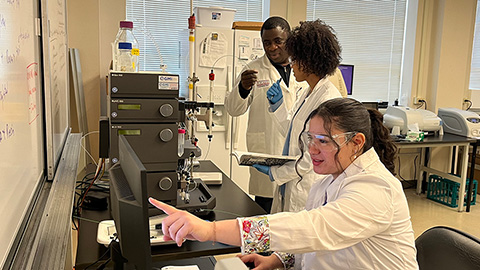Analyze this: life as a sports journalist
“I am a very unconventional sports writer,” admits Jay Jaffe. With the analytical mind of a scientist and a background that has taken him from a premed undergraduate track to the pages of Sports Illustrated, Jaffe is part of a new generation of baseball scribes more interested in using objective statistics than hagiographic mythology in their reporting and commentary.
 Jay Jaffe
Jay Jaffe
“I am a very unconventional sports writer,” admits Jay Jaffe. With the analytical mind of a scientist and a background that has taken him from a premed undergraduate track to the pages of Sports Illustrated, Jaffe is part of a new generation of baseball scribes more interested in using objective statistics than hagiographic mythology in their reporting and commentary.
Growing up in Salt Lake City, Jaffe was determined to follow in the steps of his father and grandfather and become a physician. But his father dissuaded him from doing so. Instead, says Jaffe, “he encouraged me to explore engineering, particularly biomedical engineering.” Jaffe enrolled at Brown University in 1988 as an engineering major but changed to biology after his freshman year. “I switched my concentration to biology because I was still comfortable with the idea that I would stay on a premed track,” he recalls.
The senior Jaffes were equally influential when it came to baseball. “My father was a fan and still is a fan,” says Jaffe. “My grandfather was actually a good enough player to have been offered a professional contract before deciding he wanted to become a doctor. The game was always around me.” By the time the Los Angeles Dodgers and New York Yankees engaged in three epic World Series duels between 1977 and 1981, Jaffe was hooked.
Baseball remained a fan’s pursuit during Jaffe’s days at Brown, though he had developed an interest in writing. By his senior year, Jaffe was writing about music for Good Clean Fun, an entertainment magazine published by the Brown Daily Herald. His musical interests led him to internships within the publishing industry, during which time Jaffe also began honing his desktop-publishing software skills. Slowly, he began to realize that the idea of medical school was, as he puts it, “moving further and further afield.”
However, science would continue to play a role in Jaffe’s life. “I think a scientific background offers a certain level of objective right and wrong,” he points out. “People have recognized that my background does bring some interesting skills to the table.”
 Jay Jaffe talks to Keith Olbermann
Jay Jaffe talks to Keith Olbermann
One example came during a stint doing graphic design at Bill Smith Studio, a graphic design studio specializing in textbooks and children’s books. Jaffe recalls coming up with a design layout comparing meiosis and mitosis for a textbook that he was working on. “I was able to improve upon some of the presentations that (the client) had pitched based on my background,” he says. His improvements were an immediate hit: the layout “just blew the client’s mind. I think that vaulted me from just another designer to a keeper.”
A primer on JAWS

Election to the Baseball Hall of Fame is a subjective process that relies on the opinions of the members of the Baseball Writers’ Association of America. To bring some semblance of standardization to the process, Jay Jaffe used an existing metric called "Wins Above Replacement” to come up with his own Jaffe WAR Score system, known as JAWS for short. While not an official statistic, JAWS evaluates objectively the merits of individual players.
For example, 2015 Hall of Fame inductee Randy Johnson has a JAWS value of 82.0. The average JAWS value for players at Johnson’s position is 62.1. By his JAWS measure, Johnson is qualified to be inducted into the Hall of Fame. In contrast, Jason Schmidt, who also was eligible for election in 2015 and played the same position as Johnson, has a JAWS value of 28.4, well below the average. Schmidt was not elected.
— Geoff Hunt
Despite his success in the design world, Jaffe could not ignore his passion for baseball. He had started writing about baseball in his free time and founded the Futility Infielder website in 2001 as an outlet for his compositions, which were heavily inspired by statistician Bill James and his revolutionary concept of sabermatics.
Broad metrics, such as home runs and strikeouts, traditionally have been used to evaluate individual baseball players. Sabermatics delves deeper, comprehensively analyzing various permutations of these raw numbers to generate a more accurate representation of a player’s worth. Such a novel approach to data-based player evaluation greatly appealed to the analytically minded Jaffe, who used to run his own analyses on ballplayers as a child with his pocket calculator and an Apple II+, on which he used the first spreadsheet program, VisiCalc. “I was always comfortable with the math stuff,” he recalls.
Thanks to the efforts of journalists such as Rob Neyer and Thomas Boswell, sabermatic-based thinking had finally become mainstream for sportswriters by the start of the new millennium. Jaffe’s timing was perfect, and he turned his attention to baseball writing full throttle. He contributed regularly to the sports websites Baseball Prospectus and ESPN before finally landing a regular job at the Sports Illustrated website in 2012, where he now writes full time.
As the prominence of sabermatics has continued to grow, Jaffe and his like-minded colleagues have led a revolt against the previous generations of baseball reporters who, for decades, had simply used raw numbers in their storytelling with little consideration for context or deeper analysis. “In the past decade we’ve seen a culture war,” says Jaffe. “Younger writers who came into the industry through alternative routes besides newspapers took up the (sabermatic) lexicon before the more traditional journalists did.”
Jaffe’s main contribution in this realm has been the Jaffe Wins Above Replacement Score, or JAWS, system, a data-driven framework that measures if a player is worthy of induction to the Baseball Hall of Fame. He sees his JAWS system as a natural extension of his scientific background. “Science never settles for one answer,” argues Jaffe. “It’s for searching for better answers even if they may not be simple and elegant explanations.”
Jaffe also has applied his scientific training to other aspects of his writing, most notably with regard to performance-enhancing drugs. He contributed a chapter to the book “Extra Innings” that included a detailed breakdown of the chemistry and metabolic pathways of the illicit compounds that had become pervasive in professional sports. “I’m excited about the new ways science can be brought into professional sports,” he says.
Enjoy reading ASBMB Today?
Become a member to receive the print edition monthly and the digital edition weekly.
Learn moreGet the latest from ASBMB Today
Enter your email address, and we’ll send you a weekly email with recent articles, interviews and more.
Latest in People
People highlights or most popular articles

2024 voter guide
Learn about the candidates running for ASBMB Council, Nominating Committee, Publications Committee and treasurer.

Charles O. Rock (1949 – 2023)
Colleagues and trainees remember a world expert in membrane lipid homeostasis.

Honors for Clemons, Hatzios and Wiemer
Awards, honors, milestones and more. Find out what's happening in the lives of ASBMB members.

Touching the future from the bench
Scholar, scientist, teacher and mentor Odutayo Odunuga discusses the important roles of the institutional PI, his journey and his research.

In memoriam: Darwin Prockop
He held leadership positions at multiple institutions and was known for his contributions to adult stem cell biology and cellular biology.

A look into medical writing
Our careers columnist spoke with Ashlea A. Morgan at Chameleon Communications International to get a sense of one type of work a medical writer can do.


